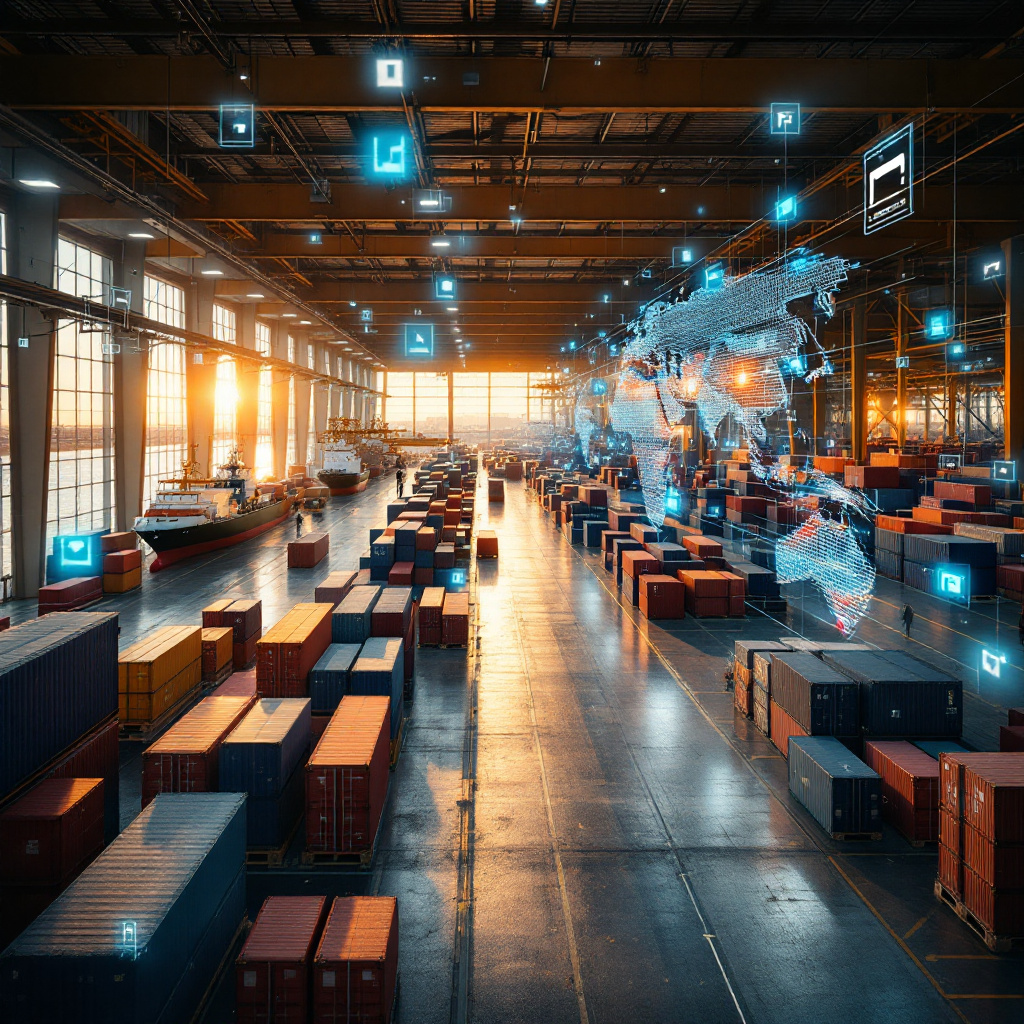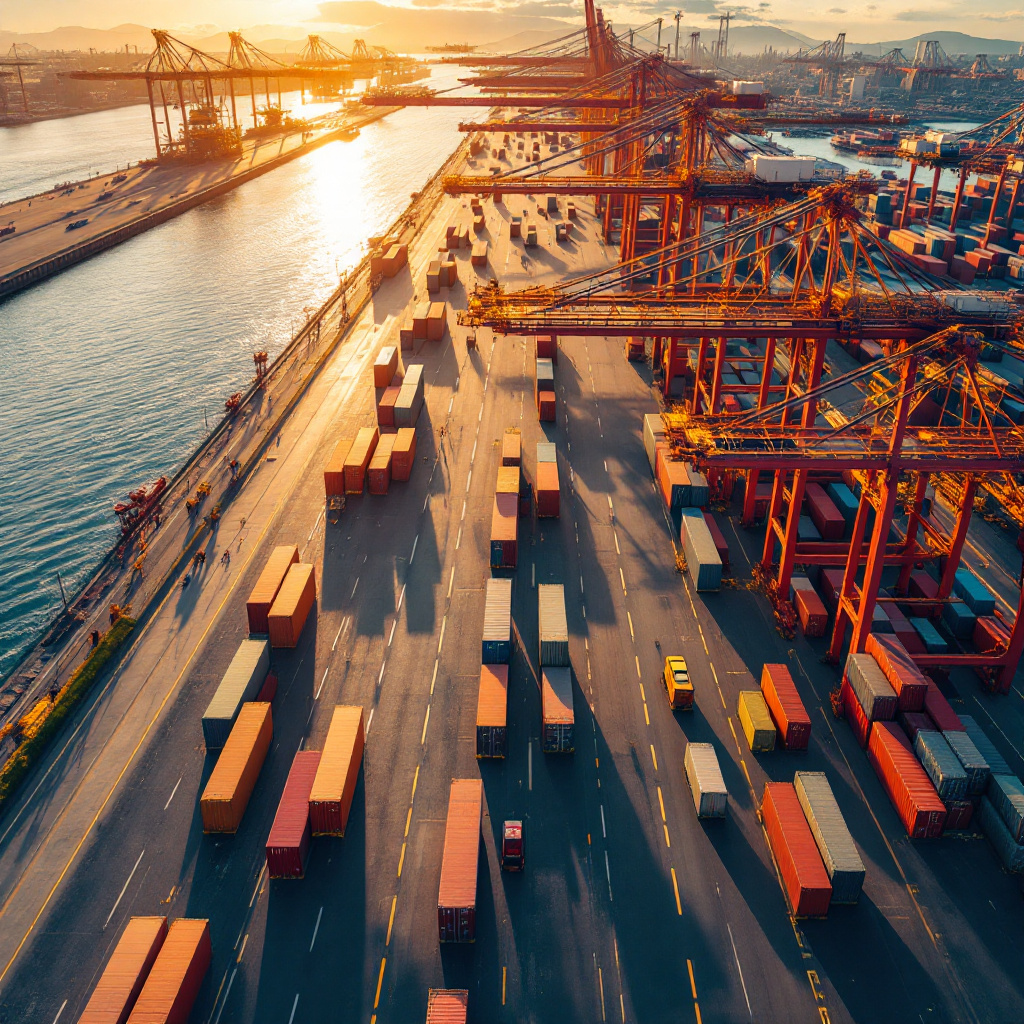container tracking with AI-powered data-driven precision
The container shipping industry is embracing advanced technologies to address inefficiencies and improve global trade flows. One of the most significant areas of change is container tracking. AI-powered IoT sensors now allow shipping companies to monitor container status in real-time. This gives both shippers and port operators unmatched container visibility during transit. By integrating real-time data with cloud dashboards, port managers can respond to disruptions quickly and reduce detention and demurrage fees. Research shows that smarter container management reduces turnaround times by up to 20% in certain terminals.
Smart containers that use satellite communication and GPS provide continuous location data, condition monitoring, and predictive alerts. These AI-powered container networks have cut lost cargo incidents by up to 30%, ensuring shipment integrity and enhancing customer satisfaction. For port operators managing high port traffic, this technology also optimizes container movements through improved logistics planning and accurate arrival predictions.
AI systems compile amounts of data from historical data sets and ongoing shipments to forecast potential delays. This enables logistics companies to focus on strategic decisions, rather than manual tracking of assets. The result is improved workflow efficiency across global logistics operations. At virtualworkforce.ai, our no-code AI email agents enable logistics industry teams to act on tracking updates instantly by automating shipment status communications, reducing response time, and ensuring accuracy in every bill of lading exchange. This approach streamlines communication, which is crucial when managing container handling at multiple terminals.
For freight forwarders and shipping companies, leveraging AI analytics for container tracking can identify the most efficient shipping routes. This helps reduce fuel consumption, mitigating carbon emissions in line with sustainability targets. Container tracking powered by artificial intelligence is not only improving operational efficiency but also reshaping customer expectations in the shipping industry.

revolutionizing container management of shipping containers to optimize port operations
Effective container management is essential to ensuring smooth port operations. AI algorithms can automate complex stacking, retrieval, and yard utilization strategies in ways human planning cannot match. This revolutionizing container approach ensures each terminal gains maximum throughput from available space while maintaining efficiency in container handling processes. By using AI in shipping, ports optimize storage capacity and reduce congestion.
AI-driven yard logistics solutions also manage shipping containers allocation dynamically, ensuring the right container is in the right place at the right time. For example, Indonesian ports enhanced crane scheduling and port traffic flow by adopting AI-powered crane and yard planning tools. These changes helped reduce turnaround times by 25%, highlighting how port automation improves both schedule reliability and terminal profitability.
Such advancements require AI powers that can process historical data alongside live operational conditions. AI helps port operators adapt to disruptions, allowing port managers to redeploy equipment and staff efficiently. This reduces dwell times and benefits the global logistics network. For logistics companies, improving container movements through AI-driven allocation reduces costs tied to detention and demurrage. It also supports efficient logistics planning, impacting carbon emissions from idling cargo vessels positively.
When combined with digital communication automation like automating shipment updates, AI-based terminal operations create seamless handoffs between physical port activities and administrative processes. The combination of physical process automation and data-driven coordination allows shipping companies to streamline overall operations, transforming traditional ports into highly responsive hubs within the container shipping industry.
Drowning in emails? Here’s your way out
Save hours every day as AI Agents label and draft emails directly in Outlook or Gmail, giving your team more time to focus on high-value work.
AI-driven logistics solutions for supply chain efficiency
AI-driven logistics solutions are increasingly critical in improving supply chain efficiency across global trade. By integrating machine learning with transport management systems, logistics companies can predict demand patterns, automate scheduling, and optimize resource use. Demand forecasting with AI applications reduces inventory costs by up to 15%, ensuring supply chain management stays responsive even during supply chain disruptions.
The maritime AI market’s rapid growth highlights its potential; valued at USD 4.13 billion in 2024 with a projected CAGR of 23%, the industry is experiencing an unprecedented adoption of AI. AI systems use real-time data and AI analytics to assess shipping routes, weather, and port congestion to optimize schedules, helping companies reduce fuel consumption and greenhouse gas emissions.
Such AI in logistics advancements enable logistics systems to improve supply chain efficiency through accurate decision-making. Virtualworkforce.ai complements these AI-driven solutions by automating routine customer and shipper communication, as shown in our guide on how to automate customer emails in logistics. By enhancing digital workflows, these platforms free logistical planners to address strategic planning instead of repetitive follow-ups.
AI algorithms also streamline processes such as freight rate analysis, inventory management, and exception handling. AI-powered dashboards help identify the most efficient modes and routes, directly enhancing customer satisfaction. This integration of AI technology into supply chain management enables logistics companies to operate with greater precision, reduce operational bottlenecks, and maintain resilient, efficient logistics networks.
Real-time cargo monitoring to transform and automate freight workflows
Real-time cargo monitoring systems are shifting how freight workflows operate. Platforms offer container visibility from origin to delivery, complete with condition alerts for container status changes. This continuous monitoring helps freight forwarders and shipping companies promptly react to incidents, minimizing losses and avoiding costly disruptions. AI-powered container monitoring not only tracks location but also leverages AI-based assessment for environmental conditions like temperature and humidity.
AI can automate customs clearance by using optical character recognition to extract shipment data from documents like the bill of lading, and then initiate process automation for compliance checks. These capabilities enable logistics companies to streamline paperwork, delivering higher accuracy and speed in document processing. The integration of drones and autonomous vehicles into last-mile delivery further enhances efficiency by reducing manual handling.
By adopting these innovations, logistics companies can integrate AI-powered freight handling solutions into their workflows. Virtualworkforce.ai’s solutions for reducing email workload in freight forwarding ensure that shipment updates from real-time cargo monitoring systems are communicated instantly to customers, improving the overall workflow between physical and digital operations.
AI helps improve customer satisfaction by enabling proactive updates and efficient problem resolution. When combined with AI applications in hardware—such as automated cranes and yard robotics—real-time cargo visibility transforms operational models across the logistics industry, ensuring efficient logistics processes at every stage of shipment handling.

Drowning in emails? Here’s your way out
Save hours every day as AI Agents label and draft emails directly in Outlook or Gmail, giving your team more time to focus on high-value work.
Revolutionize the shipping industry through AI in logistics
AI is revolutionizing the way the shipping industry operates by bringing automation, predictive insights, and safety improvements to daily operations. Autonomous vessels and AI-enabled control systems can adjust to sea and weather conditions automously, significantly improving safety outcomes. AI analyzes vessel health data to conduct predictive maintenance, preventing failures before they occur and reducing costly downtime.
Trends in AI in logistics point to tighter integration between operational planning and emergency response. According to Britannia P&I, AI helps with collision avoidance, fire risk management, and route optimisation. These benefits of AI also include lower fuel consumption and greenhouse gas emissions as AI systems identify the most efficient shipping routes.
Regulatory frameworks are advancing alongside technology to ensure safety, environment, and compliance are central to the adoption of AI. The adoption of AI promotes both economic and sustainability outcomes by reducing fuel use and carbon emissions. Shipping companies adopting AI-powered control systems position themselves to meet stricter emission regulations while maintaining operational efficiency.
For logistics companies, the integration of AI technology into operations is more than an advancement—it’s a path to greater resilience. Virtualworkforce.ai supports this shift by automating operational communications, documentation workflows, and exception reporting, which helps operational teams manage complexities without additional staff.
Enhancing Logistics Operations in the Supply Chain with Benefits of AI
AI is reshaping logistics operations and becoming an essential enabler of supply chain efficiency. The benefits of AI range from lower operating costs, reduced carbon emissions, to improved reliability of services. AI in logistics allows operational teams to predict demand, adapt capacity, and streamline routing for optimal performance.
Best practices for integrating AI in shipping include starting with targeted AI applications that address specific pain points, such as port automation in container handling or predictive maintenance in vessels. Working with AI technology providers who understand the logistics industry ensures smooth implementation. Using AI to power logistics systems improves responsiveness and enables logistics companies to adjust rapidly when faced with disruptions.
Looking ahead, AI is set to enhance not just efficiency but also the sustainability of shipping containers movement. It aligns with global efforts to cut greenhouse gas emissions across the transport sector. Adopting such technologies to improve logistics systems also enables companies to streamline their operational workflow and allocation decisions. For teams managing high email volumes, as addressed in our guide to common email tasks in logistics, automation further supports efficiency by reducing manual coordination time.
As AI is revolutionizing how supply chains operate, logistics companies that adopt these innovations early will be better prepared for the next wave of supply chain disruptions. AI helps enable logistics planning that is accurate, agile, and environmentally responsible, laying the foundation for resilient global logistics in the future.
FAQ
What is AI-powered container tracking?
AI-powered container tracking uses IoT sensors, GPS, and data analytics to monitor container location and condition in real-time. It helps shipping companies and port operators respond quickly to delays or incidents, increasing efficiency and reliability.
How does AI optimize port operations?
AI-powered solutions optimize yard space, automate container stacking, and improve equipment scheduling. This leads to reduced turnaround times, better use of resources, and enhanced terminal efficiency.
Can AI reduce shipping costs?
Yes, AI applications have demonstrated measurable cost reductions in logistics by optimizing routes, predicting delays, and managing resources more effectively. This applies to both fuel savings and reduced detention charges.
What role does real-time cargo monitoring play in logistics?
Real-time cargo monitoring ensures continuous visibility of shipments, enabling timely interventions when issues arise. It also improves coordination between freight forwarders, ports, and customers.
Are autonomous vessels already in operation?
Some autonomous vessels are in testing or limited operation, with AI aiding in navigation, predictive maintenance, and collision avoidance. These advancements are paving the way for broader adoption.
How can AI help with customs clearance?
AI uses tools like optical character recognition to read and process documents, automating customs workflows. This speeds up clearance and reduces paperwork errors.
What are the environmental benefits of AI in shipping?
AI can reduce fuel consumption by optimizing routes, which leads to lower carbon emissions. This helps shipping companies meet environmental regulations and sustainability goals.
Why is AI adoption important for the shipping industry?
Adoption of AI improves operational efficiency, safety, and adaptability, ensuring companies remain competitive in a rapidly evolving logistics landscape. It also supports compliance with stricter environmental policies.
Can small logistics companies benefit from AI?
Yes, AI in logistics can be scaled to fit the needs of smaller companies. Tools for automating shipment communications and tracking can provide significant efficiency gains without large investments.
What does the future of AI in shipping look like?
The future will likely bring greater integration between AI systems and logistics operations, with AI playing a central role in optimizing supply chain management. Advancements in automation and autonomous shipping will continue to transform the industry.
Ready to revolutionize your workplace?
Achieve more with your existing team with Virtual Workforce.